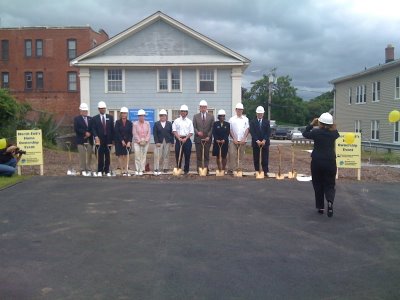This past week we welcomed back to campus a group of distinguished alumni with experience running large organizations – both profit and not-for-profit. We were discussing some of the ways that the University has responded to the current economic crisis and our plans for strategic initiatives going forward. It was good to check in with people who care deeply about the future of alma mater, but who are not invested in the specifics of how we are operating today. In this way, we can gather helpful criticism and discover opportunities for further improving Wesleyan.
There were three main areas of discussion at this meeting. The first was focused on the distinctive aspects of the Wesleyan liberal arts experience and what Wesleyan stands for in American higher education. We talked at some length about how we characterize the university’s personality. Boldness, a desire for intellectual adventure, independence and the ability to be a self-starter….these were some of the qualities that our group thought had characterized the Wes students and alumni. We discussed the importance of Wesleyan’s science programs in advancing the school’s reputation for research and rigor, while also re-iterating how key our vibrant arts scene and efforts to enhance creativity have been.
The second topic that we talked about at some length concerned the economic model underpinning our programs. About 16% of the general budget comes from endowment support – a percentage far lower than many of our peer institutions. Our reliance on tuition revenue and on generous annual support from the Wes family has allowed us to maintain a high quality program, but we must become more efficient in our use of resources while building a stronger endowment over time. We talked at some length about this year’s successful efforts to balance the budget in the face of the economic crisis, and underscored the importance of building the long-term fiscal health of the institution.
The third topic on which we spent considerable time was communication. How are we keeping alumni, students, families, prospective students, faculty, and staff informed? Are there new technologies we should be using to allow members of our community to share work, ideas, and opportunities? Should we be phasing out some of our more traditional publication vehicles, or devoting fewer resources to them?
Effective communication will undoubtedly be crucial for making more and more people aware of the great work done by the Wes family. It will also be important for raising additional support during our fundraising push over the next several years. Some at our meeting asked what we would do with additional support, and I went through the seven areas that many readers of this blog will recognize from past postings.
1. Enhancing Financial Aid. Promote access to Wesleyan by making it possible for students to attend regardless of their ability to pay.
2. Investing in Science. Support researchers and the equipment they need even with the delays in building Molecular and Life Sciences complex.
3. Enriching Undergrad Experience. Review first and last years of the student’s experience. Support for “intellectual cross-training” through porous programs.
4. Internationalization. Continue to make the curriculum more reflective of advances in global research and international cultural developments. Recruit more students from beyond the US.
5. Creativity across the curriculum. Ensure that our reputation for attracting creative students is linked to a curriculum that enhances innovation.
6. Civic engagement. Build on the tradition of activism at Wes to develop a curriculum that allows students to become more effective citizens.
7. College of the Environment. Develop the new “linked-major” in environmental studies into one of our multi-disciplinary Colleges.
The combination of traditional strengths and new initiatives should help Wesleyan maintain our leadership position in progressive liberal arts education in the coming decades. Over the next several months we’ll be talking with students, faculty, alumni, trustees and staff to determine what we want “progressive” to mean in the future. We will help ensure that “what Wesleyan stands for” in American higher education will be matched by the experience we provide our students on campus.
[tags]planning, improvement, budget, communication, financial aid, endowment, internationalization, civic engagement, College of the Environment[/tags]



